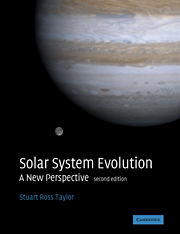Book contents
- Frontmatter
- Contents
- Preface to the First Edition
- Preface to the Second Edition
- Acknowledgments
- Prologue
- Chapter 1 A brief history
- Chapter 2 The universe
- Chapter 3 Stars
- Chapter 4 The solar nebula
- Chapter 5 Composition and chemical evolution of the solar nebula
- Chapter 6 The evidence from meteorites
- Chapter 7 Building planets
- Chapter 8 The giant planets
- Chapter 9 Satellites and rings
- Chapter 10 The refugees
- Chapter 11 The survivors: Mercury and Mars
- Chapter 12 The twins: Venus and the Earth
- Chapter 13 The Moon
- Chapter 14 The role of impacts
- Chapter 15 Epilogue: on the difficulty of making Earth-like planets
- Name index
- Subject index
Chapter 1 - A brief history
Published online by Cambridge University Press: 05 June 2012
- Frontmatter
- Contents
- Preface to the First Edition
- Preface to the Second Edition
- Acknowledgments
- Prologue
- Chapter 1 A brief history
- Chapter 2 The universe
- Chapter 3 Stars
- Chapter 4 The solar nebula
- Chapter 5 Composition and chemical evolution of the solar nebula
- Chapter 6 The evidence from meteorites
- Chapter 7 Building planets
- Chapter 8 The giant planets
- Chapter 9 Satellites and rings
- Chapter 10 The refugees
- Chapter 11 The survivors: Mercury and Mars
- Chapter 12 The twins: Venus and the Earth
- Chapter 13 The Moon
- Chapter 14 The role of impacts
- Chapter 15 Epilogue: on the difficulty of making Earth-like planets
- Name index
- Subject index
Summary
The pre-Copernican view
Pre-Copernican theories in which the Earth was the center of the universe have long lost the attention of scientists. This is not only because such theories have been superseded since the Copernican Revolution, but also because in such hypotheses the origin of the Earth, Sun and planets is inextricably bound up with the origin of the universe. The Earth could hardly be younger than the rest of the universe if it occupied the central position. We are now aware that the solar system is less than one-third of the age of the observable universe. This makes it no longer necessary, as was the case with the authors of the Book of Genesis, to seek a common origin for Earth, Moon, Sun and stars. Most of this progress has been made by the discovery of new facts, not by theories. Galileo's observations, like those of Darwin, have done more to give us a correct view of the world than most of the theorising about it over the centuries.
The Greeks
The Babylonian and Greek astronomers observed the strange motion of the planets against the fixed positions of the stars [1]. In this manner, they became aware that there were two classes of heavenly objects in addition to the Sun and the Moon. It is curious that although the ancient astronomers devoted much study to the movements of the planets, they did not spend much time considering the origin of the solar system.
- Type
- Chapter
- Information
- Solar System EvolutionA New Perspective, pp. 1 - 16Publisher: Cambridge University PressPrint publication year: 2001



